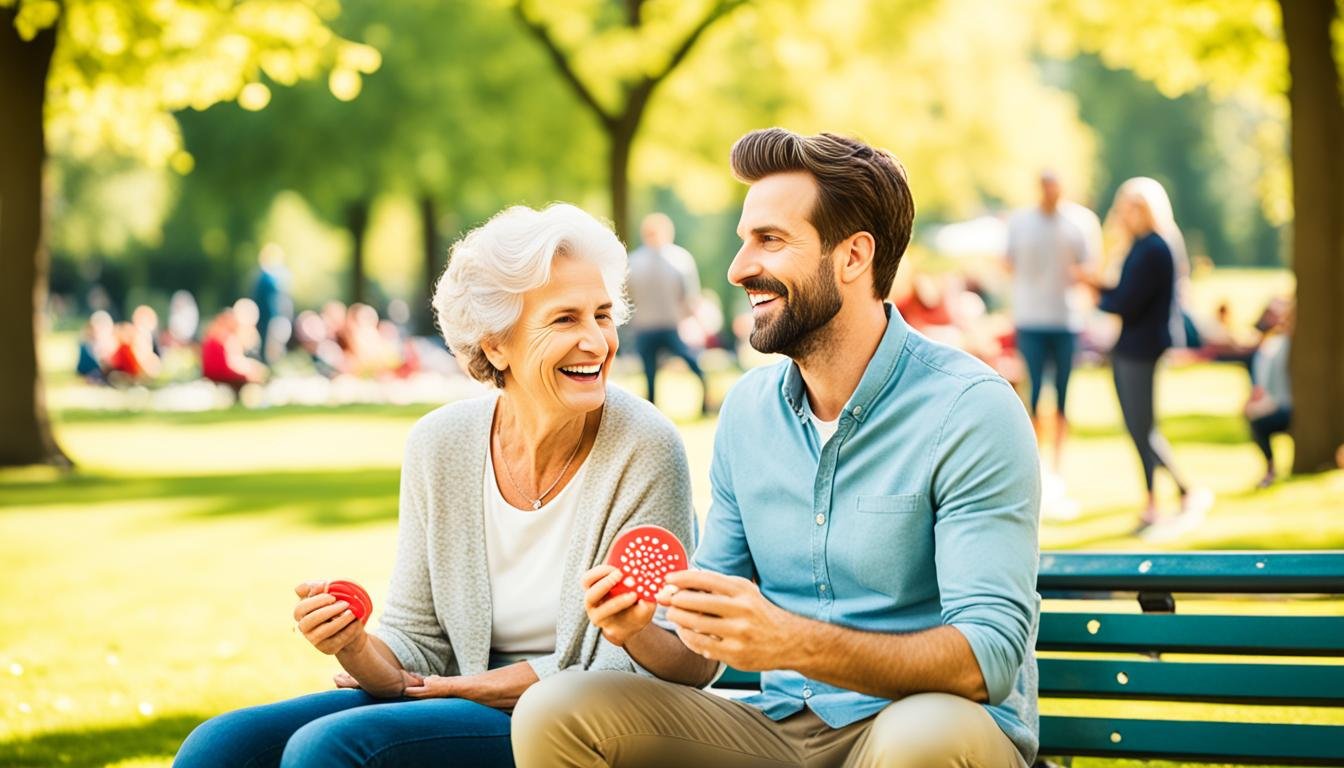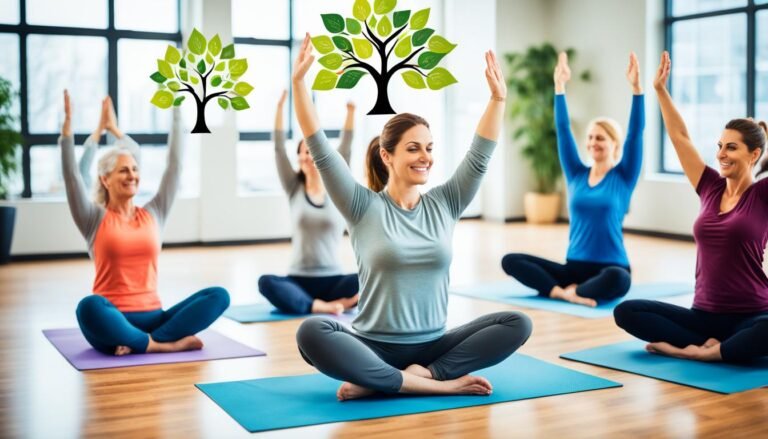Strengthening Relationships and Reducing Loneliness in Ireland
In Dublin, on a chilly afternoon, Fiona, a 72-year-old widow, gazed out the window. She watched life go by. Her days were once full of joy, friends, and outings. COVID-19 changed it all. Fiona, like many others across Ireland, felt lonely and sad. The 2021 Healthy Ireland Survey showed that 81% felt less connected, and 30% said they felt worse since the pandemic began.
In response to this, local agencies and the HSE are stepping up to help. They saw the need for more support in building relationships. Because of this, the Healthy Age Friendly Homes project is now in action all across Ireland. It got a big funding boost to help even more people in 2023. In addition, Social Prescribing services are setting up in 44 places. These services help connect people like Fiona to social and community activities that are meaningful to them.
The Irish Longitudinal Study on Ageing points out how important strong social connections are. It found that having a supportive spouse or a wide social network can help against feeling very sad. The goal is to create a strong social network that supports Ireland’s older people. This network includes community events, mental health services, and ways for people to meet up. Together, these efforts aim to beat loneliness and its effects on mental health.
Key Takeaways
- 81% of respondents in the 2021 Healthy Ireland Survey reported lower levels of social connectedness.
- 30% noted worsening mental health since the pandemic started.
- Social Prescribing services available in 44 locations encourage individual and community connection.
- The Healthy Age Friendly Homes program is expanding across all 31 Local Authorities with significant funding.
- Strong social networks and spousal support are crucial in protecting mental health among older adults.
Introduction to the Issue of Loneliness in Ireland
In recent times, loneliness has become a big issue in Ireland, especially among the older people. About 10% of older Irish adults face ongoing loneliness. Then, there’s another 7% who feel cut off from others.
Feeling majorly down, known as Major Depressive Disorder (MDD), hits about 7% of those aged 45-64. For those older than 65, it affects 3%. Generalized Anxiety Disorder (GAD) impacts 4% of the younger group and 1% of the older group. These stats are quite concerning.
Loneliness doesn’t just harm the mind. It has real impacts on the body too. A study by Valtorta et al. (2016) shows it can lead to heart problems and strokes. Holt-Lunstad et al. (2015) mention loneliness can even predict life span. This means we must treat loneliness as a major health issue.
It’s vital to know about the social circles in Ireland to find good solutions. The Irish Longitudinal Study on Ageing (TILDA) gives great info about seniors. It shows that low education, little money, and life in the country boost the chances of feeling lonely.
This means we need focused efforts to help those at most risk feel more connected.
Lack of social connections isn’t just emotionally tough. It costs society too. Research, like Anderson et al.’s work in 2018, shed light on this. It’s clear – many are struggling to feel less lonely.
It’s a wake-up call for Ireland to do better with making the lonely feel included. Only about 9.7% find things improve after two years. This shows the urgent need for uplifting programs in Ireland.
More studies on loneliness can only help. They guide us to make Ireland a better place for everyone. This calls for teamwork between the government, health experts, and community groups. Together, we can reduce loneliness and make lives better, especially for the seniors.
The Importance of Social Connections for Mental Health
Mental health improvement in Ireland focuses a lot on social connections. This is very important, especially for the elderly. Loneliness is a big challenge that we must fight. It affects mental health.
Social connections are crucial for well-being and fighting loneliness. They are key, especially for older people. We need to understand how loneliness harms us and the value of strong social networks. This understanding helps us make better plans to help our communities.
The Impact of Loneliness on Mental Health
Loneliness makes us feel isolated. It has bad effects on our mental health. In Ireland, many older adults face mental health problems. Ten percent have major depressive disorder and 5% have generalized anxiety disorder if they are 45 years old or more. Loneliness makes these conditions worse. It can lead to bad sleep, memory problems, depression, and even dementia.
So, beating loneliness is crucial for better mental health in Ireland.
Protective Effects of Social Networks
Having a good social network helps a lot against mental health issues. Research says people with more social connections have a 50% better chance of living longer. This stands true for everyone. It doesn’t matter your age, sex, or initial health. This shows why social connection initiatives are so important for better mental health.
Also, women get more benefits from social support. It lowers their mental disorder risk. But, if men are isolated, they could face more severe problems. So, it’s key to build good social support for everyone.
In sum, targeted social initiatives can greatly boost mental health in Ireland, especially among the elderly. Understanding the deep harm of loneliness and using the power of social networks is crucial. This strategy can lead to better mental health plans for the whole country.
Community Engagement Programs
In Ireland, community programs are helping people connect. They aim to stop loneliness and isolation. Over 20,000 organizations in the community and voluntary sector work on these initiatives. They help people make friends and improve their mental health.
Types of Community Programs
Many programs exist to meet society’s needs. They encourage people from all walks of life to take part in social activities:
- Social prescribing initiatives help people use community events to feel better mentally and physically.
- Age-friendly initiatives focus on making older adults’ lives better. They offer fun things to do, chance to meet others, and access to services.
- Befriending services match thousands with a friend. These buddies counter the feeling of loneliness.
These programs show how diverse the Irish community work is. They focus on building friends across all ages and backgrounds.
Effectiveness of Community Engagement
Studies reveal community programs are great at lowering loneliness and its health risks. Befriending services can really cheer people up in the short run. And these efforts create a friendly space that boosts mental health through new friends.
The Framework Policy for Local and Community Development in Ireland is all about connecting local governments and communities. Recommended initiatives from 2011 to 2012 show the government wants these programs to really meet society’s changing needs.
Although community work is popular, we need to research more and find better ways to make a difference. Yet, the ongoing dedication proves the community’s commitment to create a happier society.
Role of Mental Health Support Services
Irish mental health support services are vital in fighting loneliness and its related issues. Connecting people with the right mental health care is crucial for their well-being. Many services across Ireland offer help to those dealing with mental health woes.
Available Mental Health Services in Ireland
There are different mental health services in Ireland for all ages. Some key services include:
- Counseling and Psychotherapy: Trained professionals provide therapy for issues like depression and anxiety. This also helps with chronic loneliness.
- Community-Based Programs: Projects like ‘Heading Out’ aim to help those with mental illness connect with others. These are supported by the HSE.
- Social Prescribing: Funded by the HSE, it connects people to community groups. This improves social life and well-being.
- Specialized Support for Older People: Programs like Meals on Wheels help seniors avoid feeling isolated. They’re supported by the HSE.
How to Access These Services
Accessing mental health care in Ireland involves both public and private options. Here’s how to make it easier:
- Public Health Services: HSE funds many mental health programs, including those for older adults. These are crucial for reducing loneliness.
- Referral Pathways: Doctors, like GPs, send people to the right mental health services. They help find services that fit your needs.
- Online Resources: The HSE and other groups have web info to find mental health help near you. This makes it easier to get support.
Improving Irish mental health services is key to tackling the country’s mental health challenges. Knowing about and using these services helps with mental health care. It starts people on a path to feeling better and less lonely.
Loneliness Prevention Resources
Addressing loneliness takes many steps, and Ireland is ahead in creating resources. These aim to make more social connections and improve mental health. A study focused on 78 documents related to loneliness and social isolation. Of these, 23 were key in showing how to stop loneliness before it starts. They talk about ways to prevent loneliness in different areas.
Analysis of policies in 52 UN European countries shows loneliness is seen as a big problem. It’s seen as affecting social, health, economic, and political areas. Yet, the money for suggested loneliness solutions is often not enough. This makes it important for groups to come up with clear steps, prioritize, look at what’s been done, and spread good ideas.
It’s key to get the psychological side. Loneliness is more about not feeling close in your friendships rather than just being alone. It’s broken down into types like missing someone close, not fitting in socially, and feeling like you don’t belong. Research shows a lot more focus on loneliness since COVID-19 hit. This has negative impacts on people’s well-being, the economy, and society as a whole.
Lately, loneliness is seen as a big deal not just for health but for public policy. The World Health Organization has even formed a group to focus on this from 2024 to 2026. Their goal is to come up with a strong plan. This includes pushing for good mental health services in Ireland.
It’s scary, but loneliness and not being social lead to major health problems like heart disease and stroke. Many studies say these are big risks for heart problems and early death, especially in the elderly. Not being social enough also makes healthcare more expensive and can lead to dying sooner.
Countries like the U.K., Canada, and the Netherlands are doing things to help, focusing on specific needs. Making sure these efforts keep going is really important. For example, in France, local projects got support by talking directly with leaders. This shows how working together fights loneliness and boosts mental health in Ireland.
Strengthening Relationships and Reducing Loneliness in Ireland
Making strong social connections is key to fighting loneliness in Ireland. This issue affects many people, especially older adults. It’s important to improve how we connect with each other.
Strategies for Building Stronger Relationships
Regular, meaningful talks are essential for making relationships stronger. Here are some ways to do that:
- Encourage intergenerational activities so older adults and young people can share stories. This builds respect and friendship.
- Give chances to volunteer in the community. This helps people feel needed and part of something bigger.
- Start clubs for hobbies like gardening or music. This gives people a chance to connect over shared interests.
- Run programs that reach out to those who live alone. This makes sure they have company and support.
There are over 768,900 people over 65 facing loneliness in Ireland. Helping them can really make a difference in their lives.
Reducing Loneliness through Enhanced Social Support
Boosting social support is vital in tackling loneliness. Let’s look at how we can connect people and offer help:
- Create neighborhood groups for sharing and helping each other. This builds a strong community.
- Start mentorship programs to connect different age groups. This way, wisdom and support are shared.
- Use technology to set up online meetings for older folks. This keeps them connected, especially during times like COVID-19.
- Collaborate with groups like the Irish Council of Churches to improve community services. These organizations are key in spreading information.
Things like less education, health problems, and being alone often lead to loneliness in old age. Tackling these issues can greatly increase support in Ireland. This work will make life better for many people.
Irish Social Support Networks and Their Role
Irish social support networks like family and friends help people feel less alone. Community groups and healthcare services also make a big difference. They focus on what each person needs. This support is key in keeping people emotionally well and fighting off isolation.
Examples of Social Support Networks
Many Irish social networks help combat loneliness and build community. For instance, you have:
- Local community centers offering social activities and support groups.
- Alone Ireland, a national group that connects with older folks.
- Age Action Ireland, providing online social events for seniors.
- Close friends and family who give both emotional and practical help.
How Social Support Networks Can Help
These networks offer a wide range of benefits:
- Boosted Brain Power: Staying socially active can help old adults think better and avoid memory loss.
- Better Health: Being part of a social circle correlates to a healthier body.
- Happy Feelings: Through these relationships, people often feel less lonely, which boosts their mood.
- A Link to the Past: For those away from Ireland, these ties keep them close to their roots, creating a sense of home.
Tackling loneliness is crucial for both personal and community health in Ireland.
Emotional Well-Being Activities
Addressing loneliness with emotional well-being activities is key, especially in Ireland where the numbers are concerning. Around 768,900 people in the Republic of Ireland are over 65. Almost a third of those over 50 feel emotionally lonely, with 7.0% feeling lonely often.
These activities help fight loneliness, mainly among the older age group. Loneliness drops between 50 and 67 years but goes up over 75 years.
Lower education levels, living alone, and health issues link to higher loneliness levels. By adding activities that promote emotional health, we can help. This not only boosts emotional health but also our general well-being.
Participating in activities fights loneliness and brings big benefits. Being kind, for example, is tied to more happiness. Even small gestures like helping others or volunteering make a big difference in how we feel.
In Ireland, the COVID-19 helpline was a big help, getting 24,529 calls by June 2020. People over 70, especially those advised to ‘cocoon,’ were active. More than 75% of the callers lived alone, facing tough emotions, even suicidal thoughts.
Setting up programs to fight loneliness and encourage kindness can really help. It boosts confidence, control, and happiness. These steps are vital to make people feel they belong and cut down on isolation. Loneliness isn’t just about individuals; it affects society as a whole. So, it needs a collective response.
Friendship Promotion Events in Ireland
In Ireland, we have many chances to meet new friends through special events. These events can be small or big, and they all aim to help people connect. They fight off loneliness and make everyone feel like they belong.
Popular Friendship Events
Ireland has all kinds of events happening year-round to help people meet:
- Community Picnics: These let neighbors hang out and have fun together.
- Sporting Events: Great for meeting new people while getting some exercise.
- Music Festivals: Fun-filled events where everyone is welcome.
- Book Clubs: Perfect for book lovers who want to chat and make friends.
- Art Workshops: A place where people can share their love for art and make friends.
The Impact of Friendship Events on Loneliness
These events in Ireland do a lot to keep loneliness away, especially for older folks. Here’s what we know from studies:
- About a third of people 75 and over feel somewhat isolated, and 8% feel very lonely.
- The loneliness rate more than doubled for those 60 and older from 2019 to 2020.
- 40% of people 70 and over felt their mental health got worse because of the pandemic efforts.
- ALONE’s befriending projects have more than 60 services around Ireland, offering visits and calls to help.
So, these friendship events are not just about meeting new people. They also make us feel better and enjoy life more. It’s a win-win as we help combating loneliness through events, improving our mental health and happiness.
Loneliness Reduction Campaigns
In Ireland, efforts to reduce loneliness are growing. These campaigns fight isolation and its bad effects on health. The Joint Research Centre’s (JRC) study backs these efforts. It shows that action against loneliness works, helping many people from various groups.
Studies help us understand how to fight loneliness. They find that in Europe, 7% of adults (30 million) feel lonely often. Also, 18% (about 75 million) lack social connection. These numbers are big and similar worldwide, highlighting a global problem.
Elderly adults, over 65, face more loneliness, about 6%-10%. Many of them cope by watching TV or keeping pets. Loneliness can lead to depression and other serious health issues, showing it’s a big risk to overall health.
In Ireland, there are many efforts to help people connect. These range from social programs and therapies to better care services. For example, in 2020, many young people felt lonely. This pushed the country to act more.
Young individuals say loneliness comes from inner feelings, even when they’re around others. This means the solution is not simple. It requires smart, wide-reaching plans to succeed.
Ireland is taking on many suggestions to battle loneliness. These include more help for youths and families, and teaching educators about loneliness. Such plans aim to make society closer and more supportive.
Case Studies and Success Stories
In Ireland, several projects have done well against loneliness and built strong bonds. Looking at these success stories in relationship building helps share what works. And it teaches us from the effective moves these Irish projects have taken.
Examples of Successful Campaigns
- CLARE Project: In Belfast, this grassroot effort has been key for six years. CLARE helps older, lonely people with a mix of essential services. They aim to tackle isolation directly.
- The Campaign to End Loneliness: This project supports local activities that keep people connected. It focuses on the success of ‘whole approach’ strategies.
Lessons Learned from Case Studies
From learning from Irish initiatives, we’ve gathered some important insights:
- Multidimensional Approach: Combining support from different areas like health and community actions is key. It makes the fight against loneliness stronger.
- Emphasis on Relationship Building: Building deep, lasting relationships is what matters most. Programs that help create real friendships are very successful.
- Community Involvement: It’s vital to get local people involved in fighting loneliness. It helps create a supportive network that lasts.
- Technology Utilization: Technology can help but should not replace real human contact. It should support and not isolate further.
These success stories in relationship building stress the value of bespoke and community-focused action. They instill a culture of continuing work to weave social connections in Ireland.
Conclusion
Looking at loneliness in Ireland shows we need a full approach to tackle it. The increase in loneliness among older people is urgent. Organizations like Help the Aged and the Campaign to End Loneliness show we need everyone’s help. They have 250 groups working with them.
Loneliness can be as bad for health as smoking or drinking. For older adults, loneliness can be worse due to living alone and health issues. But it’s not just them; younger people also feel lonely. Isolation means not seeing others, while loneliness is feeling isolated emotionally and socially.
To fight loneliness, we should use community programs and mental health support. Learning from past successes is key. Relationships and loneliness greatly affect mental health. To beat loneliness in Ireland, we should involve the community, offer help, and keep talking about this issue.
FAQ
What are the main strategies for relationship building in Ireland?
Why is addressing loneliness important for mental health in Ireland?
How do social connections protect against mental health issues?
What types of community engagement programs are available in Ireland?
How effective are community engagement programs in reducing loneliness?
What mental health support services are available in Ireland?
How can individuals access mental health services in Ireland?
What resources are available for preventing loneliness in Ireland?
How can relationships be strengthened to reduce loneliness?
What role do social support networks play in Ireland?
What types of emotional well-being activities are effective in combating loneliness?
What are some popular friendship promotion events in Ireland?
How do friendship events impact loneliness?
What are some key loneliness reduction campaigns in Ireland?
Can you provide examples of successful loneliness reduction campaigns in Ireland?
What lessons can be learned from case studies on reducing loneliness in Ireland?
Source Links
- Social Isolation
- Social relationships, loneliness, and mental health among older men and women in Ireland: A prospective community-based study
- Strengthening Social Capital to Address Isolation and Loneliness in Long-term Care Facilities During the COVID-19 Pandemic: Protocol for a Systematic Review of Research on Information and Communication Technologies
- Social Isolation and Loneliness in Older Adults: Review and Commentary of a National Academies Report
- Anxiety, depression, loneliness and social network in the elderly: Longitudinal associations from The Irish Longitudinal Study on Ageing (TILDA)
- Consensus statement: loneliness in older adults, the 21st century social determinant of health?
- Social relationships, loneliness, and mental health among older men and women in Ireland: A prospective community-based study
- The Importance of Social Connection – MindWise Innovations
- Social connectedness as a determinant of mental health: A scoping review
- How do befriending interventions alleviate loneliness and social isolation among older people? A realist evaluation study
- Loneliness and social isolation interventions for older adults: a scoping review of reviews – BMC Public Health
- Layout 1
- Addressing loneliness and social isolation in 52 countries: a scoping review of National policies
- Addressing Social Isolation and Loneliness: Lessons from Around the World
- Addressing loneliness and social connectedness to improve the health and wellbeing of people over 65 years on the Island of Ireland
- Early-Life Circumstances and Later-Life Loneliness in Ireland
- Social isolation and loneliness – The Platform
- Social isolation, social support, and loneliness and their relationship with cognitive health and dementia
- Promoting social support and social networks among Irish pensioners in South London, UK
- Kindness matters guide
- Older Users of a Befriending Service in Ireland and the Maintenance of Personal Autonomy during the COVID-19 Pandemic
- Linking generations to help combat loneliness, ageism and share skills
- Friendly visiting by a volunteer for reducing loneliness or social isolation in older adults: A systematic review
- Loneliness in young people: policy recommendations
- Loneliness and social networks of older adults in rural communities: a narrative synthesis systematic review
- Microsoft Word – main_doc
- ID404 Loneliness report V2.indd
- Friendships, loneliness and psychological wellbeing in older adults: a limit to the benefit of the number of friends | Ageing & Society | Cambridge Core








